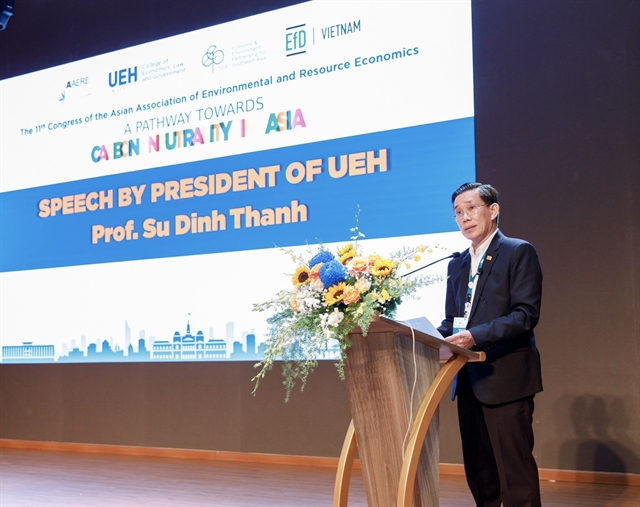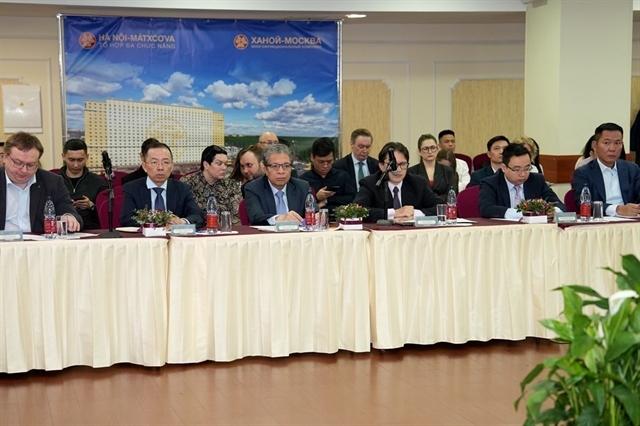 Environment
Environment

 |
| Prof Sử Đình Thành, president of the University of Economics HCM City, speaks at the 11th Congress of the Asian Association of Environmental and Resource Economics that wrapped up on Saturday (August 20) in HCM City. Photo courtesy of UEH |
HCM CITY — Considering the effects of carbon dioxide on the global climate and environment, becoming carbon-neutral is increasingly seen by governments as an urgent task to achieve sustainable development, the 11th Congress of the Asian Association of Environmental and Resource Economics heard.
The two-day congress that wrapped up in HCM City on Saturday brought together economists, Vietnamese and foreign policymakers and officials from universities and research institutes in the country and abroad.
Paul Ekins, professor of resources and environmental policy at the UCL Institute for Sustainable Resources at University College London, said the world, Asia in particular, has been facing extreme climate change.
The reduction of carbon emissions in the short term means reduced gross domestic product (GDP) and increased spending, but in the long run it would bring many new opportunities for economic development, he said.
“Radical policy interventions are required to bring about the low-carbon technological revolution. Changing this political reality is the necessary condition for the adequate mitigation of climate change and promoting environmental sustainability more generally, which alone will avoid the potentially enormous, but still very uncertain, costs of massive global change.”
Dr Muthukumara Mani, lead economist in the office of the chief economist of the World Bank's South Asia Region, spoke about the contrast between the narrative that Việt Nam wants to achieve economic success by 2045 and the climate risks that could threaten economic success expectations.
Việt Nam aspires to become a high-income economy by 2045 with GDP per capita growth of 5.5 per cent a year on average, resulting in a three-and-a-half-fold increase in per capita income, he said.
To reach high-income status, Việt Nam would need to exceed the growth rates it achieved in 1990-2020, he said.
Meanwhile, the country with 100 million people is among the most vulnerable in the world to the ravages of climate change, which poses an increasingly severe threat to its agricultural, forestry and fisheries sectors, he said.
Rising temperatures are likely to lead to heat stress and productivity losses and shorten plant growth cycles, with severe water shortages curbing annual yields in the north, he warned.
The coastal areas and cities are increasingly exposed to flooding caused by typhoons and tropical storms and the vast Mekong Delta region in the south is particularly at risk from sea level rise, he added.
Hosted by the Institute of Environmental Economics in Southeast Asia and the University of Economics HCM City, the congress, with the theme ‘A pathway towards Carbon Neutrality in Asia’ brought together scientists and policymakers for in-depth discussions to find possible solutions for a sustainable future road map.
They also spoke about topics beyond carbon emissions such as bio-diversity, water quality, waste management, and environmental and sustainable development.
It featured a session in which universities shared strategies and action programmes for carbon neutrality and building and developing a network of sustainable universities.
Many speakers agreed that reaching carbon neutrality requires tremendous changes in the energy sector in all countries as the process involves reducing fossil fuel use, switching to low-carbon or renewable energy, increasing energy efficiency, forest conservation and afforestation, and generally changing to a low-carbon lifestyle.
This process is particularly challenging for Asian countries, whose economies are fuel-based and have competing development goals.
Việt Nam has announced a solid commitment to responding to climate change with a goal of net-zero emissions by 2050. —VNS




